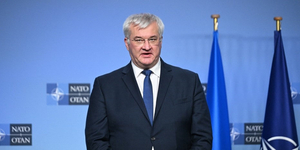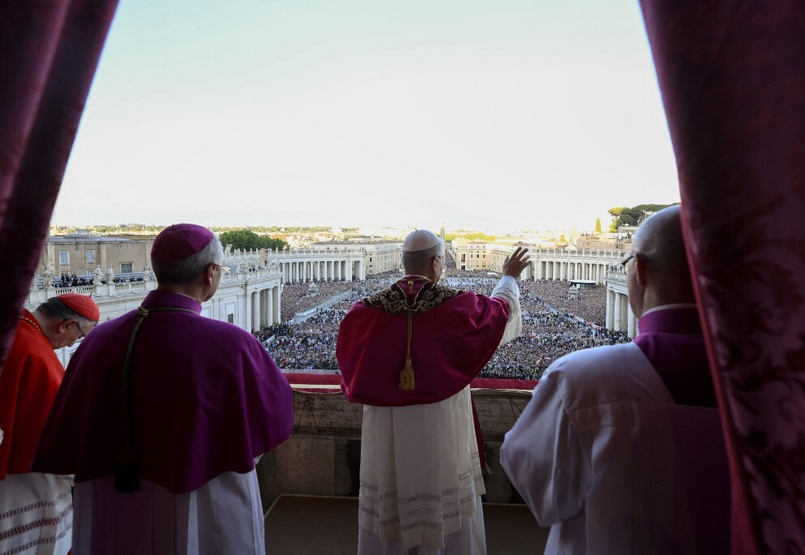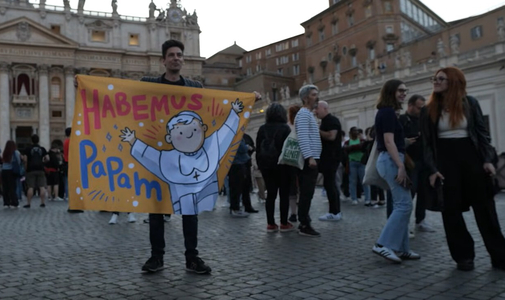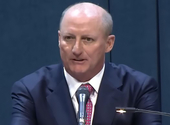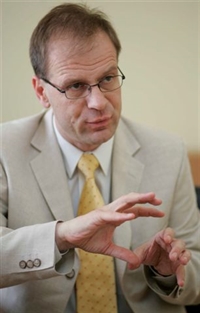 © Túry Gergely |
Those who can't, teach, it is said. Buy you seem to be going in the other direction: how does a political scientist become a leading politician in 'peacetime'?
By being elected. I don't see a problem in this. The theory of practice and politics cannot and should not be seperated from each other. Mihaly Bihari, Istvan Stumpf or Andras Bozoki were not worse politicians for having studied the theory of politics. When I became party director, I did not give up my teaching, and nor will I do so as parliamentary group leader.
Perhaps you can answer this question in your dual capacity then: can Viktor Orban continue to head Fidesz? In recent decade, no west European party leader has survived after losing two national elections in a row.
I can think of an example. Edmund Stoiber lost an election as CDU/CSU candidate for chancellor, and he continues to lead the Christian Socialists.
This isn't quite the same: he didn't stand again for chancellor, and he is not in the German federal government, either.
It could easily have been him and not Angela Merkel. But that's not the point. Fidesz will choose its senior officials on 20 May. The real question is whether Viktor Orban is an obstacle to change or not.
You clearly believe he is not.
I don't think so, no. The last three years have shown that he drives changes within his party. Fidesz's broadening into a party alliance was his idea, and he continues to lead change following the elections. Look at the parliamentary alliance between Fidesz and the Christian Democratic People's Party (KDNP).
But others say this is proof that Orban is escaping. Outsiders have no idea how this alliance of two parties from the same list will work in parliament. Do you know?
I can only say what has happened and what we are planning. At the moment, we are like a single parliamentary group. Even if this will not always be the case, we have sat together as a group thus far. It has symbolic value that the 23 KDNP MPs sit in one group in Parliament, but are surrounded by 141 Fidesz MPs: the Christian Democrats thus sit inside the Fidesz group. The two sides are equal: the joint group leadership will focus not on day-to-day business, but on strategic questions.
For the record: Orban did not want the KDNP to form an independent group, he didn't want a relationship of equality. So maybe the party chairman led change from in front, but the first page of the script was written not by him, but by Zsolt Semjen, leader of the KDNP.
This is yet more proof that Orban is not an obstacle to change, and has not lost his flexibility.
You have said several times that Orban is indispensable to Fidesz. But Lajos Kosa thinks it unlikely that he will be prime ministerial candidate again.
I see things differently. I think it possible that in 2010, Orban will appeal to those who did not vote for him in this election.
Why didn't they vote for him? Why did the Socialists win?
I am slightly biased, and not just because I was a Fidesz parliamentary candidate, but because I co-ordinated our preparations for government, and I took part in writing the manifesto. But I think the Socialists ran a very expensive and very well-planned campaign, which we could not compete with.
After two years' preparation, you only unveiled your manifesto in the last minute, which was 'accepted' by the party congress without any debate or even a vote. Was that a mistake?
It was not just because of us that the press ignored our manifesto. Certain events diverted people's attention away from it.
Are you thinking of Istvan Mikola's statements?
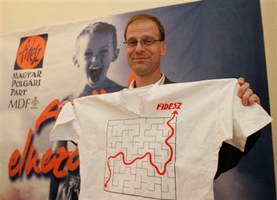 © Túry Gergely |
It's no longer important. The main elements of our manifesto emerged after Orban's state of the country speech at the beginning of the year: a 14th monthly pension, a 10 per cent cut in social security contributions, the family car programme. The government structure we drew up competed well with Tamas Sarkozy's ideas. The two visions were discussed at several workshops, and I think they influenced each other.
But who decided that your ideas should remain at the level of workshop debates and that the election manifesto should be published only in the last minute?There is a group which takes responsibility for the campaign. Our experts chose to release our manifesto in a way that, with hindsight, was perhaps not successful.
Perhaps? It would seem that the timing confused not just the voters, but the party's politicians as well. Look at Zoltan Pokorni, who said textbooks should be given to all pupils for free, and then one day later Orban said this would be means-tested.
We certainly made some mistakes in our communication during the campaign. More than we usually do, perhaps. But it wouldn't be fair to talk about this in your publication.
So let's take a look at the facts. It's striking that in the summer of 2004, the Fidesz had a lead of 47-34 over the Socialists in the European Parliament election. How can you explain the decline?
You have to remember that turn-out was much lower two years ago. The voters - even the left-wing ones - knew they could easily punish the government, because there would not be any direct consequences. Then the Socialists blamed the government - or Peter Medgyessy himself. But last year's presidential election disaster was an even more serious failure on the part of the Socialists. The Socialists ran lamely into battle, and suddenly Fidesz's popularity grew, and people started to think us worthy of government again. Paradoxically, it was precisely this desperate situation that forced the Socialists to run a very effective campaign from last September onwards. This was crucial to their victory: they managed to separate the Socialist Party's image from its record of poor government.
You have often talked about how the second Gyurcsany government's manifesto was written in silence. Isn't this just a sign of professionalism?
No. It shows they don't know what to do. There must be a problem, because Ferenc Gyurcsany has rolled up his sleeves again, which is his way of showing he has hard work to do. Gabor Horn talked about how things were heavy going, since they were agreeing first on the issues, then on the government's tasks, and only then on individuals. But it's hard to agree on issues without a structure. When devising a programme, it is right to leave personal decisions to the end, but a governmental structure and a political programme can only be devised simultaneously.
You clearly know better. But Fidesz has its fair share of confusion at the moment. The team of five in the party's presidential council apparently only talk to each other at presidency meetings, some of the old hands are withdrawing from the fray, while others have only just started to get going.
You'll get conflicts wherever there are two people. I think the aim is not to have a conflict-free party, but for these conflicts to give rise to better decisions. Fidesz has grown from 2000 members to 35,000. It's no surprise if there are tensions. Things have to change after a lost election, and we are not wasting our time. Four days after the elections, the parliamentary party met. This week the cabinet system is being established, and we have called a party conference for Saturday, which will set out our future direction. Our precise policies are not yet fixed, but all of Hungarian politics is like that.
And will we see evidence of this in the first week of parliamentary work?
The government's first hundred steps, the budget debate, budget cuts - they will influence our work as well.
Zsolt Zádori



